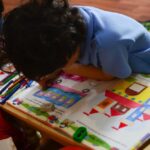
The Magic of Storytelling: How Stories Shape Young Minds
In today’s hectic world, where children are exposed to smartphones and tablets at a very young age, there’s an age-old tradition that still holds power—storytelling. Whether you are a parent, a teacher, or someone who cares for children, you have probably experienced challenging moments when a child’s tantrum seems like the worst of storms. In the middle of this storm, storytelling emerges as a powerful tool, offering not just discipline but life lessons wrapped up in interesting and imagination-building tales.
For example, think of a story where a group of friends from different backgrounds work together to solve a problem. Maybe they are saving their favourite local park from being replaced by tall buildings, or maybe they are on a journey to find hidden treasure.
Stories like the ones above don’t just provide entertainment; they teach us the importance of teamwork and friendship. Do you remember the story of the tortoise and the hare from your childhood? That story was not just about who won the race but also about the value of determination and never giving up.
But storytelling is not just about teaching lessons but also about building connections with your young one. When we share stories with children, we are not just passing on information but also sharing a piece of ourselves. Whether it is a tale from our childhood or a story passed down through generations, storytelling creates a bond that goes beyond time and space.
In India, storytelling has been a part of our culture for centuries. From ancient epics like the Ramayana and the Mahabharata to folktales passed down through generations, stories have always been a way for us to connect with our past and impart wisdom to future generations. Our grandparents and elders used to tell us stories that taught us about our culture, our values, and our traditions. It is how we learned about bravery from the stories of Rama and wisdom from the tales of Krishna.
As we navigate the challenges of modern education, it’s important to remember the importance of preserving our storytelling traditions. For preschools, daycares, and Montessori programs, storytelling should serve as a cornerstone of the curriculum, promoting the all-round development of young learners. By integrating storytelling into lessons and activities, educators can elevate engagement and reinforce key concepts in a fun and interactive manner.
In a world of screens and technology, storytelling reminds us of the power of human connection and the magic of imagination. By incorporating storytelling into our schools and homes, we can ensure that future generations continue to learn from the wisdom of the past.











